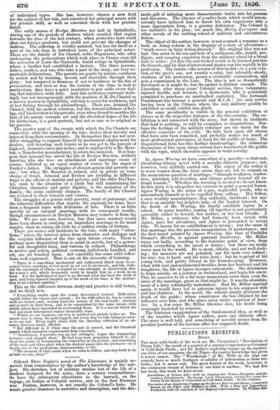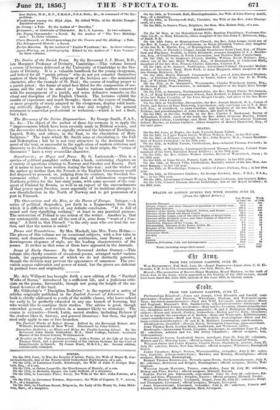PUBLICATIONS RECEIVED.
BOOKS.
THE more solid books of the week are Mr. Chesterton's "Revelations of Prison Life," the result of a quarter of a century's experience as Governor of Cold-Bath Fields ; and Dr. Baikie's exploring voyage up the mysteri- ous river of our ancesters, the old Niger—for exacter knowledge has given it newer names. The " Wanderings ' of Mr. Wills in the Alps can scarcely have so much freshness or solidity of information as these two books ; but it seems real. The great feature of the week, however, is the continuous stream of fictions of one kind or another. We had five last week, this week we have seven.
Revelations of Prison Life; wUh an Inquiry into Prison Discipline and Se- condary Punishnients. By George Laval Chesterton, twenty-five years Go- vernor of the House of Correction at Cold-Bath Fields. In two volumes.
Narrative of an Exploring Voyage up the Rivers Kwo'ra and Einem, (commonly known as the Ewer and Tsadda,) in 1854. With a Map and Appendices. Published with the sanction of her Majesty's Government. By Witham Bal-
four Baikie, M.D., R.N., F.R.G.S., F.S.A. Scot., 8ze., in command of the Ex- pedition.
franderings among the High Alps. By Alfred Wills, of the Middle Temple. Barrister-at-law.
De 0-essy : a Tale. By the Author of" Dorothy."
Rrlesmere ; or Contrasts of Character. By L. S. Lavenu. In two volumes. 27w Young Commander : a Novel. By the Author of "The Two Midship- men." In three volumes.
Clara Howard, or Heart-yearnings/or the Unseen and the Abiding: a Tale. The Beleaguered Hearth : a Novel.
Erelyn Marston. By the Author of " Emilia Wyndham," &e. In three volumes. Agnes Waring, an Autobiography. Edited by the Author of "Kate Vernon." In three volumes.
The Duties of the Parish Priest. By the Reverend J. J. Blunt, B.D., late Margaret Professor of Divinity, Cambridge.—This volume formed a course of lectures delivered at the University of Cambridge to the Stu- dents of Divinity. It is a valuable handbook for the young clergyman, and indeed for all "parish priests" who do not yet consider themselves masters of their duty. The subjects of the lectures are—the ministerial character, after the example of St. Paul; the course of reading proper to a parish priest; the frame of mind best fitted for the composition of ser- mons' and the end to be aimed at; besides various matters connected with the management of a parish, and some defensive remarks on the ritual and discipline of the English Church. The lectures exhibit the results of experience and much thought; those on the course of reading, or more properly of study adapted to the clergyman, display solid learn- ing critically digested; the style is close and weighty ; the general treatment is somewhat professional or technical,—which is not a fault, but a fact.
l'he Harmony of the Divine Dispensations. By George Smith, F.A.S., • &c.—The object of the author of these lay sermons is to apply the
"improvements which have been recently made in Biblical science and the discoveries which have so signally crowned the labours of Rawlinson, Layard, Botta, and others, in the East, to the elucidation of Holy Scripture." The topic which Mr. Smith aims at elucidating is the Fall and Redemption ; but he is not very attractive in the doctrinal treat- ment of the text, or successful in the application of modern criticism and discovery to its elucidation. Although lay in their origin, the "series of discourses" have a very en-mot:like character.
Scandinavia; or Hopes and Fears. By G. Latterstedt.—This is a species of political pamphlet rather than a book, containing chapters on a variety of questions relating to Norway and Sweden and Russia. Part of it seems to have been written during the late war; and the wishes of the author go farther than the French or the English Government would feel disposed to proceed, or, judging from its conduct., the Swedish Go- vernment either. It contains a good deal of information respecting Northern politics for the last sixty years, with some account of the con- quest of Finland by Russia, as well as an expose of the encroachments of that power upon Sweden,_ more especially of its insidious attempts to sow dissatisfaction in the North of Norway and to get possession of a port in Finmark.
The Obstruction and the Man, or the Forces of Europe. Integer.--"A series of political rhapsodies, put forth in a fragmentary form from which it is difficult to arrive at any definite conclusion. It is full of sound and fury signifying nothing," at least to any practical purpose. The restoration of Poland is one notion of the writer. Another is, that our contemptible state, and all the rest of it, arise from "want of a Can- ning." A third is, that Disraeli "is the only man who can lead the na- tion, and that the nation is waled."
Poems and D'unslations. By Mrs. Michell, late Mrs. Torre Mime.— The pieces of this volume are on occasional subjects, with a few tales in verse, and dramatic scenes. Pleasing sentiments, easy fluency, and a drawmgroom elegance of style, are the leading characteristics of the poems. It strikes us that some of them have appeared in the Annuals.
Songs of Early Summer. By the Reverend Archer Gurney.—This volume also chiefly consists of occasional poems, arranged under various heads, the appropriateness of which we do not distinctly perceive, though the division may prevent the appearance of sameness. The exe- cution argues cultivation and power of mind, but the pieces are deficient in poetical force and originality.
Mr. Aris Willmott has brought forth a new edition of the "Poetical Works of Burns," introduced by a sufficient life, and a judicious criti- cism on the poems, favourable, though not going the length of the na- tional devotees of the bard.
Mr. Gilderdale's "Discipline Rediviva" is the reprint of a series of articles originally published in the English Journal of Education. The book is chiefly addressed to youth of the middle classes, who leave school too early to be perfectly educated in any one branch of learning, but who would like to continue their studies. The advice is good, though somewhat general, and written in a manner likely to stimulate. The course is extensive—Greek, Latin, sacred studies, including Hebrew if the student likes it, history, and general literature : but then, the pupil need only apply to one or two branches.
The Poetical Works of Robert Burns. Edited by the Reverend Robert Aria Wilmott, Incumbent of Bear Wood. Illustrated by John Gilbert. Discipline Redirira ; or Hints and Helps for Youths leaving School. By the Reverend John Smith Gilderdale, ALA., Oriel College, Oxford ; Assistant Master of the Forest School, Walthamstow.
A Treatise on the Cure of Stammering; with a Notice of the Life of the late Thomas Hunt, and a general Account of the various Systems for the Cure of Impediments in Speech. By James Hunt, M.R.S.L., 7w. Second edition, considerably enlarged.



























 Previous page
Previous page